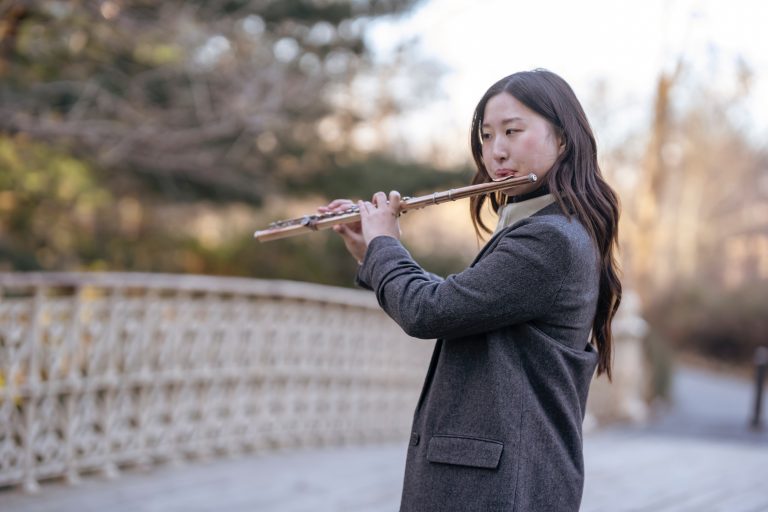During World War II, the U.S. Army field hospitals were filled with wounded soldiers. In hot weather, with hordes of mosquitoes and a severe shortage of medicine, the rate of surgical infection and mortality was very high, and morale was low among the wounded. Under these circumstances, a doctor played everyone’s favorite music. After the sick and injured heard the music, infection and mortality rates dropped dramatically, and the surgical healing period was shortened significantly.
The ancient Chinese have long put stock in the ability of music to heal. The character meaning “medicine” is yao (藥), which derives from yue (樂), meaning “music.” Zhu Zhenheng, a famous doctor of the Yuan Dynasty, once said that “music is also medicine.”
Chinese historical documents show records of treating diseases through music that go back much further. For example, Master Lü’s Spring and Autumn Annals – Music of the Ancients, written in 239 B.C., described the use of dance and music to regulate the disorders caused by tightness of the muscles and bones linked with depressive energy.
The Garden of Persuasions, written prior to 700 B.C., contains records of a Hmong shaman, from an aboriginal tribe 5,000 years ago, who played a bamboo flute to heal his patients.
A famous poet of the Tang Dynasty, Bai Juyi (772–846), wrote a poem about healing ailments with music: “A sound comes to the ears, and everything leaves the heart.”
Music’s remedial effect
Success
You are now signed up for our newsletter
Success
Check your email to complete sign up
The ancient Chinese believe: To cure a disease, one must seek the root. The word “root” refers to yin and yang. According to Daoism, yin and yang are the laws of the universe, the origin of all things, and the fundamental driving force behind the growth and demise of everything in nature.
In Master Lü’s Spring and Autumn Annals — Great Music, it was written: The origin of music is a faraway one. It is born from changes and is rooted in Dao. The Dao gives birth to heaven and earth, and heaven and earth produce yin and yang. … music is the product of the harmony of heaven and earth, and the tuning of yin and yang.”
Ancient Chinese believed that music originates from the Way, or Dao, and comes from the dual interactions of yin and yang. It corresponds to the five elements of heaven, the five seasons of the earth (with the summer season divided into both summer and late summer), and the five organs of man. Music is the use of external patterned sound to reconcile the yin and yang in the human body, achieve balance, and conform to the natural state of divine unity.
The Yellow Emperor’s Classic of Internal Medicine – Su Wen says: “There are five tones in heaven and five organs in man.” The ancients developed a pentatonic scale, associating the five tones of gong, shang, jue, zhi, and yu (宫商角徵羽) — equivalent to do, re, mi, sol, and la of Western music — with the five main organs defined in traditional Chinese medicine:
The liver corresponds to the tone jue (角), as music composed around this tone is described as being high and long. The heart is related to zhi (徵), a tone that taps into passion. The tone gong (宫) matches the spleen, as it is smooth and soft, and the lungs are related to shang (商), for it is sharp and crisp. Finally, the kidneys correspond to yu (羽), which is compelling and clear. The tones interact with each other to regulate the vitality of the five main of organs of the human body. The tones interact with each other to regulate the vitality of the five main organs of the human body. This corresponds as well with the five elements: wood (liver), fire (heart), earth (spleen), metal (lungs), and water (kidneys), under which each of the secondary organs are also categorized.
In the process of listening, one’s emotions and the rhythm and frequency of the tones, and the regular vibrations among the five organs can achieve the effect of regulating one’s spirit and clearing the meridians.
Righteous and elegant music cultivates the mind
An ancient instrumental piece entitled “White Snow in Early Spring,” composed by Shi Kuang, a famous musician during the Spring and Autumn Period ( 771 to 476 BC), was said to be initially a tune for the five-stringed zither which the Heavenly Emperor ordered the fairies to play. After hearing it, Shi Kuang recorded it in simulation. According to the “Magical Secret Score,” “Early Spring” is in the key of gōng; “White Snow” is in the key of shāng.
Music composed in the gōng tone is usually graceful and grand. By contrast, the theme of the shāng tone is soft yet vigorous, bringing out a lyrical and gentle temperament and a positive and determined temperament at the same time. The “Early Spring” takes on the meaning of spring and the breeze, expressing the selfless grace of the heavens to all things, while “White Snow” carries the meaning of winter with snow and bamboo, representing the virtuous bearing of the earth. Only people with virtue to match heaven and earth can perform it.
The now-lost Classic of Music, edited by Confucius, instructed readers in the use of music to regulate human morality, cultivate emotions, and harmonize the qi and blood.
The ancient sages, for example, created rituals and music not to satisfy physical desires, but to cleanse the evil in people’s hearts and expel impure thoughts. Righteous music stimulates innate goodness and protection against worldly desires that cloud man’s true nature, bringing people back to the right path for human beings. Material possessions always bring new desires, yet external matters cannot satisfy the heart. Decadent music encourages indulgence in material pleasures.
According to the “Annals of Music” in the Records of the Grand Historian, Duke Ling heard the tune of a zither being played in the middle of the night when he was visiting Duke Ping. He asked his musician to learn the song and play it for Duke Ping. Upon hearing the song, musician Shi Kuang, who was present at the court, pressed on the zither strings to stop the music and said, “This is the sound of a declining state, do not play it any further.” He explained that the song was composed by Shi Yan, who played decadent tunes to King Zhou of the Shang Dynasty.
King Zhou later lost his throne and the composer was exiled and committed suicide by drowning. This song, Shi Kuang warned, would weaken the country in which it was played.
Duke Ping insisted on listening and ordered Shi Kuang to play something even sadder. Shi Kuang urged him not to listen to such melancholy pieces. But Duke Ping still would hear the music.
The first time Shi Kuang played it, a dark omen of 16 black swans appeared in front of the court; the second time he played it, all the black swans stretched their necks, cried out and flapped their wings. The Duke found it very interesting and wanted to hear an even more foreboding tune. Shi Kuang tried again to persuade him not to listen to this kind of music, but the Duke thought that since he was getting old, he should be able to listen to whatever he liked. Shi Kuang had no choice but to play. While he was playing, white clouds surged up from the northwest sky, a gale blew, lifting the tiles off the rooftop, and rain fell. All the guests ran for their lives. The Duke was so frightened that he hid inside. After that, there was a severe drought in the kingdom of Jin, and no grass grew for three years.
For individuals, righteous and elegant music can nurture morale, foster noble aspirations, cultivate the mind, and prolong life. On a broader scale, it helps to govern the nation, educate the people, and bring peace and prosperity to the state.
On the other hand, chaotic music characterized by lustful and vulgar sound can cause people to fall into a state of disorder and indulge in carnal desires. It serves to harm the human body and corrupt the entire nation. Modern rock and roll is known for loud noise and chaotic sound, leading to personal indulgence and a life dominated by desires. As we can see, rock musicians often abuses drugs, live promiscuously, and die prematurely.














